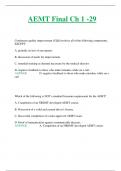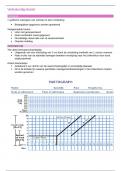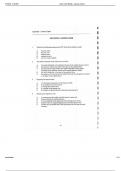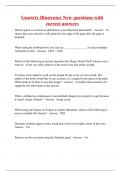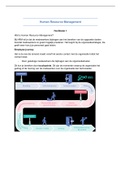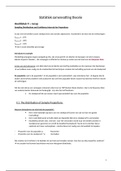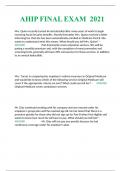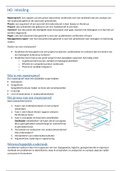Law of Delict Class Notes:
When does conduct create responsibility, liability and justice?
When is a norm violated?
There can be no violation, unless there a norm, or law recognised.
Society dictates boundaries which are acceptable and unacceptable.
Lecture 1: Defining delict
American legal realism: Determine what the law was by looking at legal texts. Realists
challenged this formalist idea because law is a social construct.
How does realism help us in defining delict?
o RG McKerron reading: Broad definition stating the word “delict” in Roman law,
applied to both criminal and civil wrongdoings. When RG adopts the meaning,
similar to that of English law, he refers to delict as a civil wrong. A person’s right to
claim redress for the breach of a duty owed by another person. Further defined,
delict is the breach of a duty imposed by law, independent to the will of the person
bound by. This duty then grounds an action for damages owed when the person
who is owed the duty has suffered harm in consequence of the breach.
o Van der Merwe and Olivier: Delict is a principle-based approach, broad ideas
instead of definite rules. Delict is a wrongful and culpable act which causes harm to
another or infringes another’s personality interest.
Elements from this definition:
wrongfulness,
culpability/fault,
act,
causation,
harm (1. Affects a person’s property, 2. Affects a person’s
personality interest)
o PQR Boberg: Shows the influence of English law. Criticised VDM and Olivier as they
mentioned fault as one of the elements, but there as instances in SA law where strict
liability is imposed (liability without fault).
Eg. vicarious liability (employer liable for employee’s conduct), animal owner
found liable for harm caused to another person.
A delict is an infringement of another person’s interest (right) – this
definition is very limited as the duty is not imposed by law here.
Did not limit the scope of delict to compensation – how do you calculate
damages for a case of nuisance. In that case, the relief would be in the form
of ceasing the offensive action.
o Van der Walt and Midgley: Wide definition: Civil is a civil wrong. Narrow definition:
delict is the wrongful and blameworthy conduct which causes harm to another.
Midgley uses general and specific definitions.
Main forms of delictual conduct emerge:
1. Delict that causes patrimonial/pecuniary loss (loss that can be calculated
and has a monetary value) - Wrongful and culpable conduct which
causes patrimonial harm to the plaintiff [actio legis aquilia]
2. Delict that affects dignity and feelings and reputation (non-patrimonial
harm and difficult to be valued in money) – Wrongful and intentional
, infringement of an interest of personality [actio inuriarum]. Solatium
given as monetary compensation for damage to personality interests.
Action can sometimes involve both actio inuriarum and actio legis
aquilia.
3. Conduct that causes pain and suffering associated with bodily injury –
Wrongful and culpable conduct which causes non-patrimonial loss
associated with bodily injury to the plaintiff. Remedy is the Germanic
action for pain and suffering.
Causes of action (type of harm suffered) may differ, but underlying elements
and principles of delict are standard. Relief will be provided if the facts justify
the relief of the principles in each category of harm – facts need not state
principles, but must be apparent from the conduct that the delict occurred and
relief is necessary.
Neethling and Potgieter: Delict considered private law by them, but more and more, delict
is becoming more about the Constitution and social interests. Delict can be summarised by
five elements/principles, however, the generalising approach is subject to distinguishing
between patrimonial delict and non-patrimonial delict. Distinguishing principles come from
principles of actio’s and germanic action for pain and suffering for bodily injury. Exceptions
are minor: strict liability, certain forms of harm are known in practice under specific names
(eg. misrepresentation, emotional shock, which has its own unique requirements).
Criminal law is about punishment, whereas delict is about compensation.
In customary law, family would have to compensate for wrongful conduct by a family
member.
Under customary law, women have a subservient status, and father is awarded damages for
delict against women.
No general delict, specific delicts.
Customary law recognises theft as a delict and you would have to pay twice the amount of
the theft and an amount that acts as a fine.
Law structures and removes the power of retribution to the government, educates people
on what is right and wrong, deters people from wrongful conduct.
a. Start with harm: different types (damage to property, pain and suffering, damage to
personality)
b. Conduct: act or omission
i. Look to conduct situated closet to harm and look for wrongfulness if positive act
c. Causation: Factual or legal
d. Wrongfulness: Broad test based on reasonableness of imposing liability, boni mores.
e. Capacity: Ability to distinguish between right and wrong
f. Fault: negligence, intent
Remedies: damages, interdict, apology or retraction
Purposes of delict:
o Compensation: Primary function of delict
Corrective justice: When there has been a wrong, something must be done to
correct it. Best way to correct it is through compensation.
, Readings indicate that compensation is never perfect. Cannot fully compensate for
the entire experience, may take very long to sort out the matter and the delay may
cause irrecoverable losses.
If contingency fee, not fully compensated.
o Protect interests and compromises:
Protect the three types, financial and immaterial property, earning capacity,
reputation
o Promotes social order and cohesion:
To prevent people from taking the law into their own hands
Need an independent third party to enforce the law
o Values and deterrents:
Law imposes duties on you and tells you how you ought to behave to regulate
human conduct
o Personal responsibility and loss spreading:
Wrongdoer must take responsibility for their actions by justifying why they acted
the way they did, or must compensate the victim
Social good to be protected by loss spreading
o Promoting the constitution and upholding democracy and protecting human rights in
SA:
Constitution imposes obligations on the state to promote and protect human rights
African Charter is the only international human rights charter which imposes
human rights obligations and duties on non-state actors (public persons)
Boonzaier article: In English law you could not sue the King or government. In SA law, Binda
v Colonial Government in 1887, recommended the legislature intervene the legal position on
this and passed the Crown Liabilities Act, which became the State Liability Act in 1957 which
is still in force
o S1 of State Liability Act: If you would have been able to sue the state in delict or
contract, if it was natural person, this legislation makes it possible to claim in contract or
delict against the state
o Further requirement for delict: the wrongdoer must be a servant of the state and when
you commit the delict, you committed it in the course and scope of your employment
(otherwise the state might be liable for personal actions in your own time). This holds
the state liable for stately acts – vicarious liability.
o Possible to attach the states property if liable in a delictual dispute and must then sell
property to settle debt if insolvent.
Price article: Holding the state liable in delict give effect to the constitutional value of state
accountability.
o Accountability – Responsibility to account for what has been done, give reasons and
justify it.
o Other mechanisms aside from delict: lay a charge at the police, and if they don’t want to
prosecute, go the SCA.
o Can hold accountability by voting, and protest, force the state to take action through a
mandamus.
o Sometimes, delict is not the best solution to holding the state accountable.
How are delicts different from crimes and contracts?
If we enter into a contract the agreement is completely voluntary.
, In delict, no agreement is needed for conduct.
Contract key requirement is legality.
Both of them give rise to obligations
Crimes in delict are civil law whereas other crimes fall under criminal law
What are the common theories used to justify the existence of the law of delict?
Does delict play any special role in the SA context in particular?
Tutorial: MCQ’s and essay type questions:
Write an essay in which you explain your opinion on how the SA concept of delict should be
defined. In constructing your explanation, you are required to evaluate definitions that have
been provided by SA delict academics over the years. You must also show a serious
appreciation for the functions of the law of delict in the SA context (10 marks).
Sources: transformative delict:
o Defined by Karl Klare – const. is transformative because it commits us to working
with the const. long term in various ways to bring about legal and social change.
o Sources: Delict is heavily based on case law
Const. of 1996:
Supreme law of the land, is the foundation of all other law
S39 and s172 speak on how laws and conduct must be in line with
the const. and if it is not, it can be struck down and deemed illegal
Created the CC, highest court in the land to hear matters of const.
effect/importance
S2 = supremacy of the const.
Legislation:
Primary source of law, binding on all members of
community/citizens
Local, municipal, provincial, national
Secondary legislation (RAF)
Provision whereby a minister is delegated to draft legislation to
regulate a matter. Ie. Director/Minster of Transport must/did this in
the Road Accident Fund Act
Case law:
Most important in delict
Primary sources of law and is binding
Precedent (stare decisis) – earlier or previous decisions by a court
must be precent for considering current cases
Importance – hierarchy of the courts
Lower court decisions are not binding on higher courts – full length
decisions hold more weight than that of a single judge
Minority – often the obiter dictum
Ratio decidendi – reason for the decision made by the courts
Citation of cases depends on where it is reported
International law
Foreign law
Common law
Custom
When does conduct create responsibility, liability and justice?
When is a norm violated?
There can be no violation, unless there a norm, or law recognised.
Society dictates boundaries which are acceptable and unacceptable.
Lecture 1: Defining delict
American legal realism: Determine what the law was by looking at legal texts. Realists
challenged this formalist idea because law is a social construct.
How does realism help us in defining delict?
o RG McKerron reading: Broad definition stating the word “delict” in Roman law,
applied to both criminal and civil wrongdoings. When RG adopts the meaning,
similar to that of English law, he refers to delict as a civil wrong. A person’s right to
claim redress for the breach of a duty owed by another person. Further defined,
delict is the breach of a duty imposed by law, independent to the will of the person
bound by. This duty then grounds an action for damages owed when the person
who is owed the duty has suffered harm in consequence of the breach.
o Van der Merwe and Olivier: Delict is a principle-based approach, broad ideas
instead of definite rules. Delict is a wrongful and culpable act which causes harm to
another or infringes another’s personality interest.
Elements from this definition:
wrongfulness,
culpability/fault,
act,
causation,
harm (1. Affects a person’s property, 2. Affects a person’s
personality interest)
o PQR Boberg: Shows the influence of English law. Criticised VDM and Olivier as they
mentioned fault as one of the elements, but there as instances in SA law where strict
liability is imposed (liability without fault).
Eg. vicarious liability (employer liable for employee’s conduct), animal owner
found liable for harm caused to another person.
A delict is an infringement of another person’s interest (right) – this
definition is very limited as the duty is not imposed by law here.
Did not limit the scope of delict to compensation – how do you calculate
damages for a case of nuisance. In that case, the relief would be in the form
of ceasing the offensive action.
o Van der Walt and Midgley: Wide definition: Civil is a civil wrong. Narrow definition:
delict is the wrongful and blameworthy conduct which causes harm to another.
Midgley uses general and specific definitions.
Main forms of delictual conduct emerge:
1. Delict that causes patrimonial/pecuniary loss (loss that can be calculated
and has a monetary value) - Wrongful and culpable conduct which
causes patrimonial harm to the plaintiff [actio legis aquilia]
2. Delict that affects dignity and feelings and reputation (non-patrimonial
harm and difficult to be valued in money) – Wrongful and intentional
, infringement of an interest of personality [actio inuriarum]. Solatium
given as monetary compensation for damage to personality interests.
Action can sometimes involve both actio inuriarum and actio legis
aquilia.
3. Conduct that causes pain and suffering associated with bodily injury –
Wrongful and culpable conduct which causes non-patrimonial loss
associated with bodily injury to the plaintiff. Remedy is the Germanic
action for pain and suffering.
Causes of action (type of harm suffered) may differ, but underlying elements
and principles of delict are standard. Relief will be provided if the facts justify
the relief of the principles in each category of harm – facts need not state
principles, but must be apparent from the conduct that the delict occurred and
relief is necessary.
Neethling and Potgieter: Delict considered private law by them, but more and more, delict
is becoming more about the Constitution and social interests. Delict can be summarised by
five elements/principles, however, the generalising approach is subject to distinguishing
between patrimonial delict and non-patrimonial delict. Distinguishing principles come from
principles of actio’s and germanic action for pain and suffering for bodily injury. Exceptions
are minor: strict liability, certain forms of harm are known in practice under specific names
(eg. misrepresentation, emotional shock, which has its own unique requirements).
Criminal law is about punishment, whereas delict is about compensation.
In customary law, family would have to compensate for wrongful conduct by a family
member.
Under customary law, women have a subservient status, and father is awarded damages for
delict against women.
No general delict, specific delicts.
Customary law recognises theft as a delict and you would have to pay twice the amount of
the theft and an amount that acts as a fine.
Law structures and removes the power of retribution to the government, educates people
on what is right and wrong, deters people from wrongful conduct.
a. Start with harm: different types (damage to property, pain and suffering, damage to
personality)
b. Conduct: act or omission
i. Look to conduct situated closet to harm and look for wrongfulness if positive act
c. Causation: Factual or legal
d. Wrongfulness: Broad test based on reasonableness of imposing liability, boni mores.
e. Capacity: Ability to distinguish between right and wrong
f. Fault: negligence, intent
Remedies: damages, interdict, apology or retraction
Purposes of delict:
o Compensation: Primary function of delict
Corrective justice: When there has been a wrong, something must be done to
correct it. Best way to correct it is through compensation.
, Readings indicate that compensation is never perfect. Cannot fully compensate for
the entire experience, may take very long to sort out the matter and the delay may
cause irrecoverable losses.
If contingency fee, not fully compensated.
o Protect interests and compromises:
Protect the three types, financial and immaterial property, earning capacity,
reputation
o Promotes social order and cohesion:
To prevent people from taking the law into their own hands
Need an independent third party to enforce the law
o Values and deterrents:
Law imposes duties on you and tells you how you ought to behave to regulate
human conduct
o Personal responsibility and loss spreading:
Wrongdoer must take responsibility for their actions by justifying why they acted
the way they did, or must compensate the victim
Social good to be protected by loss spreading
o Promoting the constitution and upholding democracy and protecting human rights in
SA:
Constitution imposes obligations on the state to promote and protect human rights
African Charter is the only international human rights charter which imposes
human rights obligations and duties on non-state actors (public persons)
Boonzaier article: In English law you could not sue the King or government. In SA law, Binda
v Colonial Government in 1887, recommended the legislature intervene the legal position on
this and passed the Crown Liabilities Act, which became the State Liability Act in 1957 which
is still in force
o S1 of State Liability Act: If you would have been able to sue the state in delict or
contract, if it was natural person, this legislation makes it possible to claim in contract or
delict against the state
o Further requirement for delict: the wrongdoer must be a servant of the state and when
you commit the delict, you committed it in the course and scope of your employment
(otherwise the state might be liable for personal actions in your own time). This holds
the state liable for stately acts – vicarious liability.
o Possible to attach the states property if liable in a delictual dispute and must then sell
property to settle debt if insolvent.
Price article: Holding the state liable in delict give effect to the constitutional value of state
accountability.
o Accountability – Responsibility to account for what has been done, give reasons and
justify it.
o Other mechanisms aside from delict: lay a charge at the police, and if they don’t want to
prosecute, go the SCA.
o Can hold accountability by voting, and protest, force the state to take action through a
mandamus.
o Sometimes, delict is not the best solution to holding the state accountable.
How are delicts different from crimes and contracts?
If we enter into a contract the agreement is completely voluntary.
, In delict, no agreement is needed for conduct.
Contract key requirement is legality.
Both of them give rise to obligations
Crimes in delict are civil law whereas other crimes fall under criminal law
What are the common theories used to justify the existence of the law of delict?
Does delict play any special role in the SA context in particular?
Tutorial: MCQ’s and essay type questions:
Write an essay in which you explain your opinion on how the SA concept of delict should be
defined. In constructing your explanation, you are required to evaluate definitions that have
been provided by SA delict academics over the years. You must also show a serious
appreciation for the functions of the law of delict in the SA context (10 marks).
Sources: transformative delict:
o Defined by Karl Klare – const. is transformative because it commits us to working
with the const. long term in various ways to bring about legal and social change.
o Sources: Delict is heavily based on case law
Const. of 1996:
Supreme law of the land, is the foundation of all other law
S39 and s172 speak on how laws and conduct must be in line with
the const. and if it is not, it can be struck down and deemed illegal
Created the CC, highest court in the land to hear matters of const.
effect/importance
S2 = supremacy of the const.
Legislation:
Primary source of law, binding on all members of
community/citizens
Local, municipal, provincial, national
Secondary legislation (RAF)
Provision whereby a minister is delegated to draft legislation to
regulate a matter. Ie. Director/Minster of Transport must/did this in
the Road Accident Fund Act
Case law:
Most important in delict
Primary sources of law and is binding
Precedent (stare decisis) – earlier or previous decisions by a court
must be precent for considering current cases
Importance – hierarchy of the courts
Lower court decisions are not binding on higher courts – full length
decisions hold more weight than that of a single judge
Minority – often the obiter dictum
Ratio decidendi – reason for the decision made by the courts
Citation of cases depends on where it is reported
International law
Foreign law
Common law
Custom

